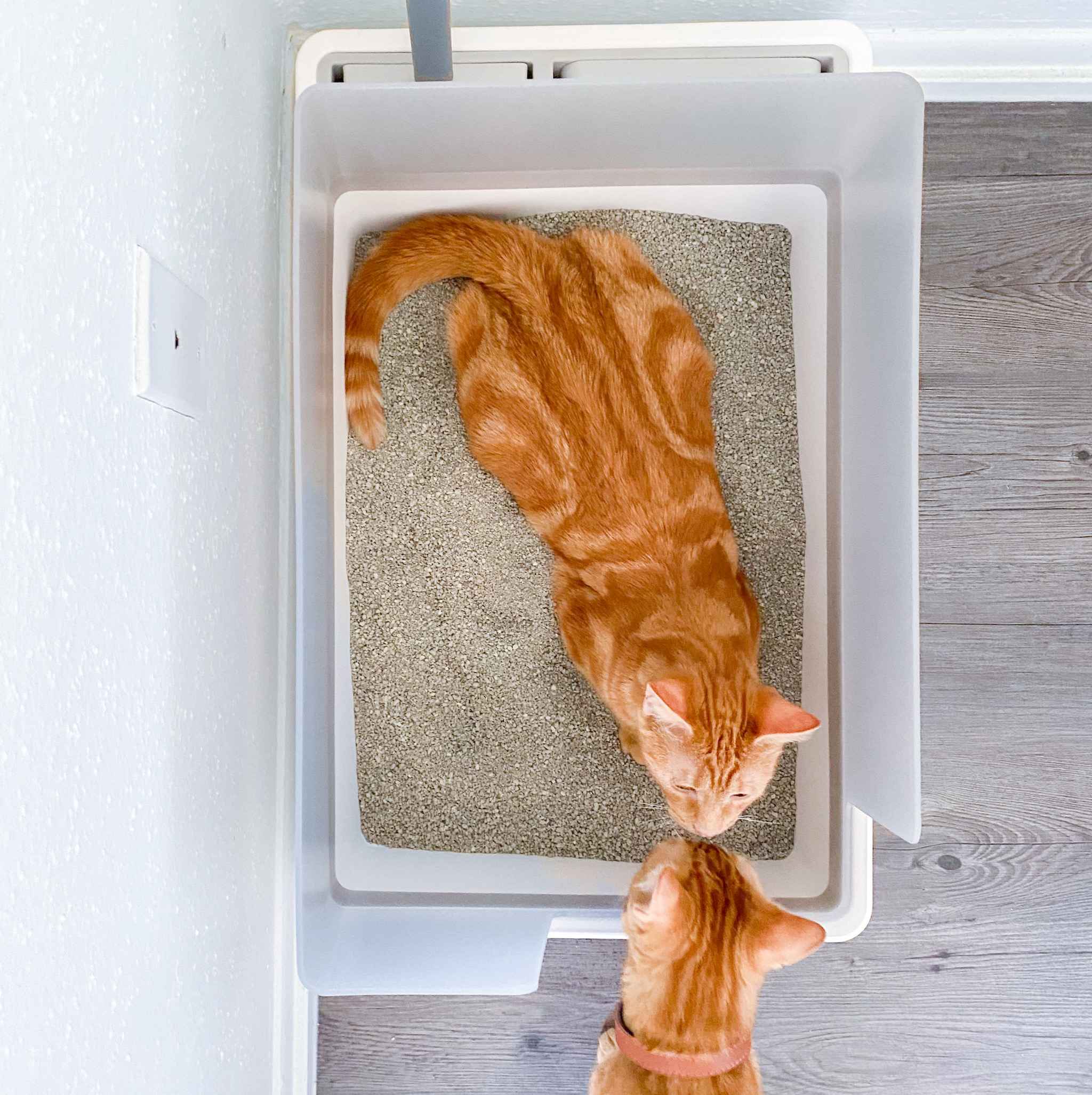If you are considering getting a new kitten, congratulations! Cats can make wonderful pets and bring lots of joy and companionship into your life. However, there are several things to consider before bringing a kitten home. This new kitten checklist will guide you step-by-step through everything you need to know to prepare for your new arrival. We also recommend reading how to raise a kitten for more information on things like choosing a kitten food and kitten-safe toys.
Here at tuft + paw, we are cat experts. The information in this article is based on consultation with a cat behaviorist, veterinarian, discussion with other cat parents, and our team’s own personal experiences adopting kittens.
Note: this checklist is for cat parents adopting a 8-12 week old kitten, not for cat parents who need to raise a kitten litter. If your cat has a surprise litter, consult your vet for guidance.

Kip Cat Cushion by tuft + paw - Shop Here Credit: @buckminsterscatcafe
Before You Get Your Kitten
|
Find a Reputable Adoption Agency
Once you’ve made the exciting decision to adopt a kitten, the next step is to find a reputable adoption agency. We always encourage prospective cat parents to adopt rather than purchase from a breeder, but this article applies to both situations. You can visit your local animal shelter or rescue organization to find a kitten that needs a home, or even keep an eye out for cat parents you know whose cats may have a litter. One member of our team adopted a kitten from his cousin, whose unspayed outdoor cat had an unexpected litter (more on spaying/neutering your cat later). If you decide to go through a breeder, make sure to do your research. Look for breeders who are registered with trustworthy organizations and who have a good reputation.
If you’re open to having more than one cat, consider adopting two kittens from the same litter or even from two different litters. This provides so many benefits, including more socialization and learning opportunities, increased confidence, a constructive outlet for playful energy, and a generally enriched life from having a buddy around.
Note: The absolute earliest that a kitten can be separated from their litter is 8 weeks old. A better age is 12 weeks, at which point the kitten will have had valuable socialization time with their siblings and mom. If someone offers kitten adoption at younger than 8 weeks, that’s a big red flag.
Kitten-Proof Your Home
Before bringing your new kitten home, you will need to prepare your home. This includes:
|
Purchase All Necessary Supplies
You will need to gather all the essential supplies before bringing your new kitten home. Below is a comprehensive list divided into two parts: absolute essentials and then recommended items which are nice to have and/or make life easier.
Kitten Essentials
|
Recommended Kitten Items
Tip: For cat parents who want to get a bunch of their new kitten supplies in one fell swoop while saving a bit of cash, we have two different bundles:
|

Grove Modern Cat Tower by tuft + paw - Shop Here Credit: @alx__dz
Prepare Yourself for Cat Parenthood!
Raising a kitten is an incredibly enjoyable and exciting experience, but it does require lots of composure. Remember, this mischievous fur ball is literally a baby animal, so treat them with love and patience, and never yell at them or punish them for bad behavior. Instead, redirect their attention and deal with whatever problem they’ve caused. Think about how this situation could be prevented in the future. Reward them when they exhibit good behavior. They don’t know your expectations, so it’s all about teaching them how to live in harmony with the other members of their household.
@tuftandpaw No need for punishment when it comes to your feline family member ❤️🩹 Cats don't *really* understand the concept of punishment and it won't do any good. Put simply, its cruel AND ineffective. Instead, focus on positive reinforcement and setting clear boundaries. If your cat is scratching furniture, provide them with their own scratching post and reward them when they use it. This will help them understand what behavior is acceptable and, in the process, strengthen your bond with them. So, don't punish – reward! 😽 #catcaretip #catcare #catparent #catparentsunite #catexpert #catbehavior #catbehaviorissues #cattipsandcare #badcats #Later ♬ original sound - tuft + paw
Bringing Your Kitten Home
|
Introduce Your Kitten to Your Home
When introducing your kitten to their new home, it's important to remember that this can be a stressful experience for them. They are leaving behind their familiar surroundings and may feel scared and overwhelmed. It's important to introduce them to their new environment slowly and give them time to adjust.
A great way to do this is to confine them to a small room or area of your home initially, such as a spare bedroom. This will give them a chance to get used to their new surroundings without feeling overwhelmed by the entire house. Make sure to provide them with all the essentials in this room, such as a litter box, a cozy bed, and bowls for food and water.
Once your kitten has settled into their confined space, you can start introducing them to other parts of your home (after they’ve been kitten-proofed, of course). You can do this gradually over the first week, allowing them to explore one area at a time. Supervise your kitten during these explorations to ensure their safety and provide reassurance if they become scared or overwhelmed.

Dock Bowl and Stand by tuft + paw - Shop Here
Establish a Feeding, Play, and Litter Schedule
Establishing a consistent schedule is important for your kitten's well-being and also allows you to match their routine to yours. Building a schedule is totally your call, but generally it’s helpful to break the day into morning, afternoon, and evening. Keep the following information in mind:
- Kittens need to be fed several times a day and should have access to fresh water at all times. A feeding schedule prevents overeating.
- Kittens need a minimum of two 15-minute play sessions every day, but may need more depending on their energy levels.
- Most kittens instinctively know how to use the litter box, but if they don’t you may need to teach them. After every meal, place them in the litter box and dig around in the litter with your hand to demonstrate. They should get the idea within a few days. For more detail check out how to litter train a kitten.

Cove Modern Litter Box by tuft + paw - Shop Here Credit: @abdulscats
Socialize and Bond with Your Kitten
Socializing with your kitten is important for their emotional and behavioral development. Spend time playing with your kitten and bonding with them and expose them to new people, places, and experiences. They might seem scared at first, but just reassure them and over time they’ll realize there’s nothing to be afraid of. This is how kittens build confidence and it will help them feel comfortable and secure in their new home.
If you have children in your home, we recommend introducing them to the kitten one at a time and emphasizing that the kitten needs to be handled gently. If you have other pets, introduce them across a closed door where they can smell and touch each other’s paws. Gradually allow them to have contact through a very slightly opened door, then in the same room, then in the whole house.
Gently pick up and hold your kitten multiple times per day, even if they resist at first. Touch their ears, paws, tummy, and tail so they get used to being handled. This will make it much easier to hold them in the future and make vet visits a lot easier.
Here are some other things to expose your kitten to in their first few weeks:
|
Schedule Your First Vet Appointment
When you know the exact day your kitten is coming home, schedule a vet appointment within the first week—the sooner the better. The vet will give your kitten a full-body examination for signs of any abnormalities or sickness. They will also set up a vaccination schedule, inform you about spaying/neutering, and answer any questions you may have.

Taking Care of Your Kitten
|
Schedule Regular Veterinary Checkups
After your first vet checkup, the vet should give you a schedule for regular checkups. Your kitten will need to receive vaccinations and be checked for any health issues in their first 16 weeks. By 4-6 months, you’ll want to have your kitten spayed or neutered to prevent hormone-related behavior like spraying, aggression, and yowling. Establish a consistent relationship with a reputable veterinarian and get your kitten used to them.
Groom Your Kitten Regularly
Grooming your kitten regularly is important for their health and hygiene. This includes brushing their fur, trimming their nails, and cleaning their teeth. This is where getting them comfortable with being handled pays off. Every day you should pick them up and touch their paws and mouth, and slowly progress towards clipping their nails or brushing their teeth. Try to groom them when they’re sleepy, such as after eating, when they’re sleeping, or just after they wake up. Beyond improving your kitten’s health, regular grooming will help you both bond and encourage physical contact.
Keep Your Kitten Safe and Healthy
Keeping your kitten safe and healthy is important for their overall well-being. This includes:
- Keeping them indoors to protect them from outdoor dangers (e.g. other cats, predators, parasites, cars)
- Providing a safe, quiet, and comfortable environment.
- Monitoring their behavior and health.
- Responding promptly to any signs of illness or injury.
Conclusion
Bringing a new kitten home can be an exciting and rewarding experience. However, it is important to be prepared and take the necessary steps to ensure your kitten's health and well-being. By following this new kitten checklist, you can make sure that your new buddy has everything they need to thrive in their new home.






